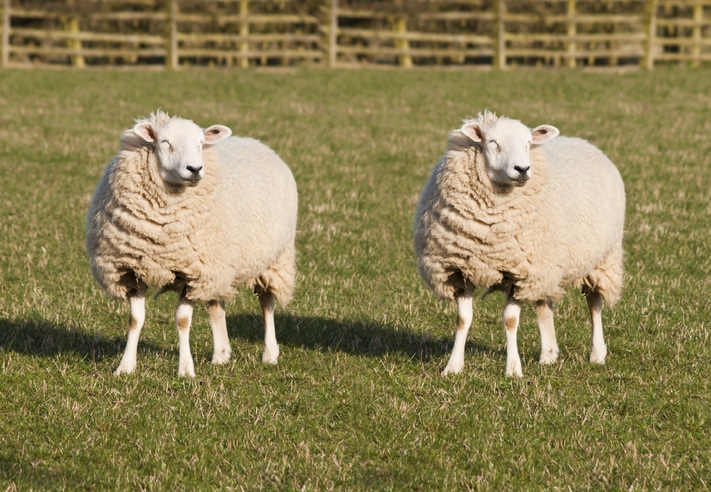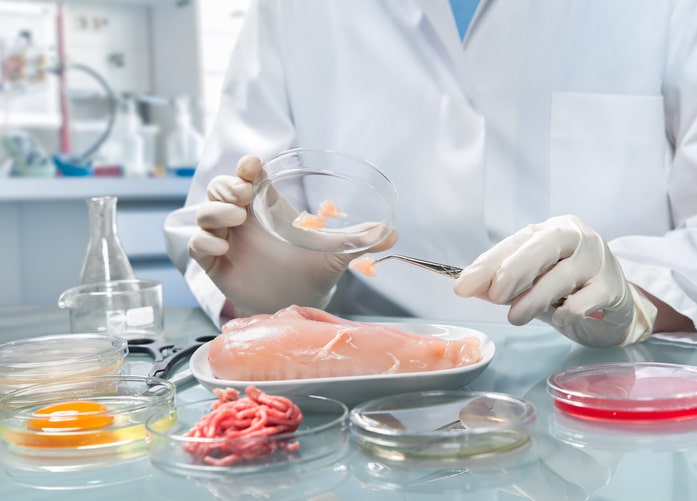
You may be familiar with the development of animal cloning over time, such as Dolly the sheep, which was cloned in 1996. However, what you might not be familiar with is how this practice relates to food safety and food supply. When an animal is cloned, their genetic makeup is copied via the replacement of an egg cell’s nucleus with that of a mature somatic cell, with no need for an egg-sperm union. The subsequent DNA transfer leads to a new embryo, which is then transferred to a surrogate before eventually being delivered.
Cloning animals for food production hasn’t been a particularly long-standing practice, and further studies will need to be published regarding this topic over time. Currently, the sale of cloned meat is prohibited in Canada, and there are numerous questions that must be addressed before authorities can consider whether or not it should eventually be approved.
What Are Animal Clones? And Why Are They Used for Food?
An animal clone occurs when an animal’s genetic makeup is copied and a replica is made. This is distinct from genetic engineering, where changes are made to the genetic makeup. Cloning animals typically takes place via a process known as somatic cell nuclear transfer (SCNT). This process involves several steps:
- An egg from a female animal is removed, and the nucleus carrying the genetic material is then removed from the egg
- The animal that will be cloned has the nucleus removed from one of its somatic cells
- The nucleus is placed into the egg
- An embryo is formed from the egg cell, and is implanted into a female surrogate
- The surrogate carries the embryo to term, without any need for fertilization
The nucleus from a mature somatic cell replaces an egg cell’s nucleus during this process
Research findings dating back to 2008 from the United States’ Food and Drug Administration (FDA) conclude that food made from various types of cloned livestock and their offspring are equal to eating naturally-reproduced animals. These animals are primarily goats, cows, and pigs. A risk assessment was later published, and drew three key conclusions:
- Cloned animals do not have any differences compared to those that are naturally bred in terms of their composition
- An animal’s health is not in danger when cloned, and does not carry greater risk than natural reproduction
- Therefore, food made from cloned animals does not pose risks to those eating it
Students enrolled in regulatory affairs programs should also note that farmers can find a use in cloned animals for the purpose of improving herd quality. This is because animals with certain desired characteristics, such as their production of meat or milk, can be cloned and used for breeding purposes. In practice, this means that cloned animals are more commonly used for breeding, with their offspring being the ones used for food production.
Certain qualities, such as a cow’s ability to produce milk, makes them attractive for cloning
Why Animal Cloning for Food Is Illegal in Canada, Explained for Regulatory Affairs Students
Despite the FDA’s findings, selling food made from cloned animals and their offspring is illegal in Canada. In order for it to become legal, it would have to be classified as a “novel food” and be reviewed and granted approval from Health Canada. Essentially, novel food encompasses food that is made through unconventional means and has not traditionally been consumed by the public. There are noticeable differences between novel food and pre-existing food products, and there are three categories that fall under Health Canada’s definition:
- Food made or packaged through processes that lead to significant changes for the food product, or processes that this type of food had not previously been used for
- Food borne from genetically modified animals, plants, or microorganisms, for the purpose of them displaying previously unseen characteristics
- Substances not known for historical use as food products
Many questions will need to be answered regarding safety and labeling of this food
The possibility of making food from cloned animals legal in Canada cannot be realized without first asking a number of questions with regards to regulatory affairs. Professionals will need to carefully review data to ensure that the food is safe to consume.
In addition, if cloned meat were to enter Canadian markets, it could raise additional questions and concerns. For example, would food from cloned livestock and their offspring need to be labeled upon receiving approval in Canada, even if this is not necessary in the United States? While it may be a long time before regulatory professionals need to consider these implications, they could be on the horizon if cloned animals become more commonplace in the food industry.
Are you looking to pursue careers in regulatory affairs?
Contact the Academy of Applied Pharmaceutical Sciences for more info!






